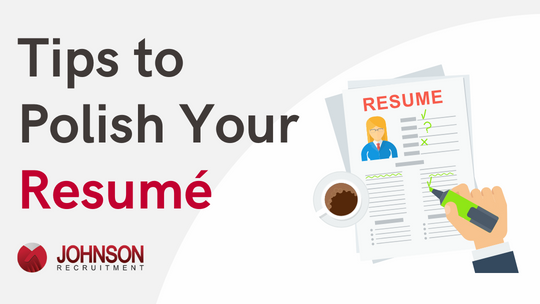Tips to Polish Your Resumé
We receive hundreds of resumes every day (yes, real humans read your resume!) and have seen our fair share of very good… and very bad.

If you consider the limited time a hiring manager or recruiter has to assess each application, it is essential to ensure your most relevant experience for the job you are applying for jumps out and is easily recognisable to the reader. The reality is that your resume will be skim-read and if your resume is badly formatted, difficult to read, and missing important skills, it gives a poor first impression and may see your application moved to the discard pile.
We understand that writing or updating a resume can seem daunting so we have compiled our best tips to help yours stand out from others competing for the same role. You can check it out here:
Formatting and Presentation Your Resume
- Use modern, easy-to-read fonts.
- Incorporate headings and subheadings. They are ‘sign posts’ your reader will use to navigate the document.
- Keep the formatting consistent throughout and review the text alignment and spacing.
- Prioritise an aesthetically clean and functional resume over one with too many graphics, columns and ‘busy-ness’. Focus your efforts on getting the content right, rather than an overly complicated design.
- Please, please, please avoid including a photograph of yourself. Unless you are applying for a role that specifically requires a headshot, you don’t need to include one on your resume, especially if it’s a ‘selfie’.
CV Content
- The first page of your resume is ‘prime real-estate’, and should include:
- Your full name, phone number and email address at the top. You do not need to show your full address, but do include your city/town.
- A short personal summary that provides a career ‘snapshot’. Avoid writing an objective statement as they are often not useful in a resume context.
- 3 – 4 dot points of your key skills and core capabilities as well as your education and training. Make sure you clearly label each with the course name, institution and date of graduation/completion.
- List your professional experience in reverse-chronological format. This means you start with your most recent/current at the top and work backwards. Hiring managers don’t want to shuffle or scroll to the end of the document to find your most recent experience.
- Keep your resume short, succinct and relevant to the role you are applying for. Don’t list your high school subjects, if you have enjoyed a long career, highlight your most recent and most relevant, and avoid listing every role you have ever had.
- Tailor your resume in a way that demonstrates your suitability against their criteria.
- Unless you are shifting industries or have a short work history, try to avoid using a ‘skills-based’ resume that places more emphasis on aggregate skills rather than work history. Potential employers still like to see how your skills developed over time, and at which job they have been used.
- Think of ways you can quantify your experience. You may not have actual data that you can present, but a range or estimate can be useful in supporting your claims. For example, if you said, ‘During my time at XYZ, I lead a team of up to 10 receptionists, 5 nurses and 2 typists’. This is significantly more ‘stand out’ information than if you simply said “I lead a large team”.
We hope these tips have given you the inspiration and practical tools you need to get your resume in tip top shape!
Job seeker & resumé tips from Johnson Recruitment
Johnson Recruitment is an independent recruitment and consulting firm specialising in the Community Services, Social Purpose, Health and Medical sectors, as well as in the recruitment of Practice Managers and support staff, across all sectors. Contact us on 03 9946 7320 or info@johnsonrecruitment.com.au to learn more about how we can assist you with a vacancy or new role today. Follow our LinkedIn and Facebook pages for more information and to keep up to date with the latest jobs, events and career advice.
READ MORE